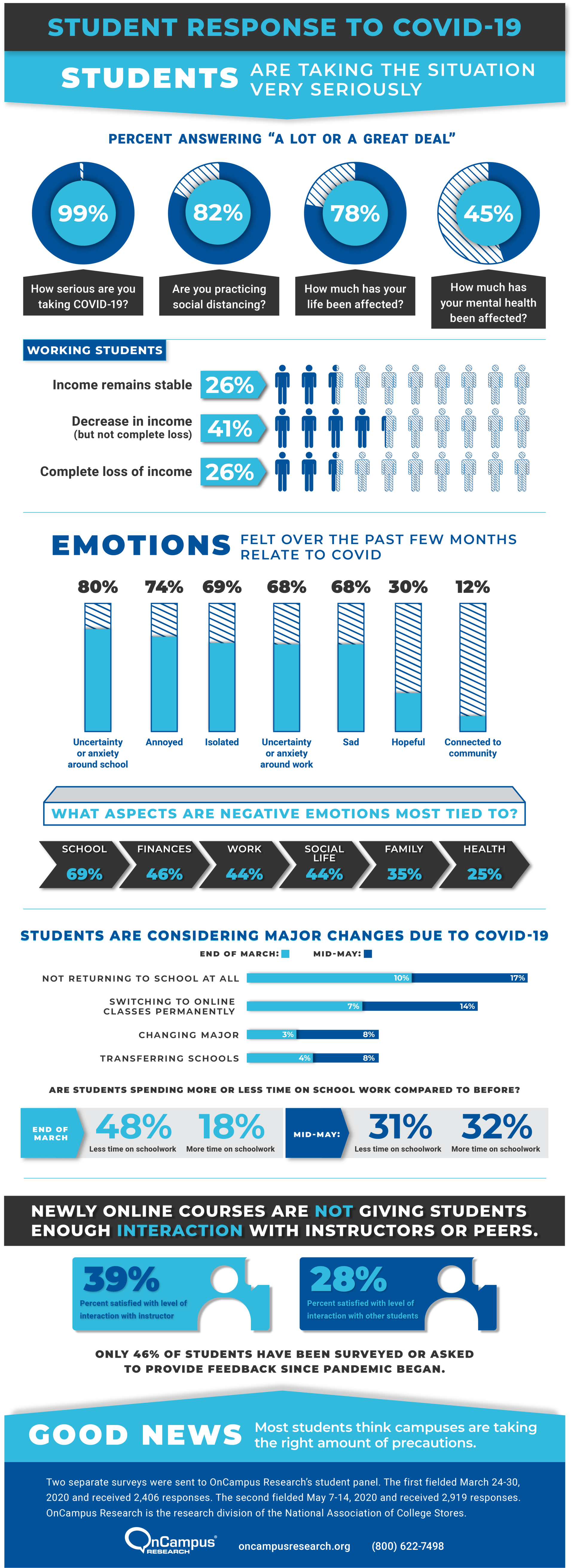Student Perspectives
Student Perspectives
Along with the
COVID-19 Resources
page NACS is regularly updating and conversations on The Hub, OnCampus Research has put together a list of resources specific to the student perspective during this sudden transition to online learning.
Some in the industry, as mentioned by a PhilOnEdTech article included in the resources, have begun to notice that while information and resources have begun pouring out on the impact COVID-19 has had on higher education, little of it is focused on students themselves or their perspective and feedback during all of this. As gathering and reporting on the student perspective is one of the main functions of OnCampus Research, we have created this page as a means to share information and resources specifically dealing with the student perspective. Resources are divided into information that has already been gathered from students and helpful resources for campuses looking to gather feedback from their own students.
Student Response to COVID-19
OnCampus Research sent two separate surveys out its panel of students nationwide on March 24-30 when many institutions were in the process of closing, and again on May 7-14 with many of the same questions to track how things had changed. 2,406 student responses were collected in the March survey and 2,919 were collected in the May survey.
Of the May student respondents, 80% said they are uncertain or anxious about school (down from 85% in March) and 47% feel confused (a drop from 54%). Those declines, along with an increase in students who feel “hopeful” (30%, up from 24%), may be a sign some students are coping well. But, on the May survey, a higher percentage of respondents also said they feel annoyed (74%), isolated (69%), helpless (51%), and angry (52%). Only 12% have a sense of connection “to my community” and 68% expressed sadness. After deciding to remain in her dorm when UC Berkeley closed, a graduating senior kept a journal
that illustrates how many students may be feeling.
That emotional response may explain why a growing number of students are rethinking their college plans. In March, 10% were considering not returning to school; in May, the percentage had jumped to 17%. Some 14% of students are pondering a permanent switch to online classes, up from 7%. Thirty-eight percent may start a temporary job, an increase from 32% in March. Roughly twice as many students are now giving thought to transferring or changing majors as in March.
- Only 46% of students reported they’d been asked for feedback by their institution or professors since the pandemic began.
- More respondents showed concern about having access to device for Internet service for online classes (25%, up from 19% in March).
- More were also dissatisfied with their interaction with fellow students and instructors during online classes, and with the level of rigor in those classes.
- Students have been spending more time on school work, with 32% saying they are doing more (up from 18% in March) and 31% doing less (a big drop from March’s 48%).
- With nowhere to go, students have ramped up their online shopping, with 46% reporting they are shopping online more (up from 24% in March) and only 19% are shopping online less than before the pandemic (compared to 34% in March).
Collection of student perspectives
Phil on Ed Tech
TopHat Sudent Survey
Tallo Surveyed student multiple times during the pandemic to track changes in responses
Short SurveyMonkey poll of college students
Campus Sonar Coronavirus Higher Ed briefings
COVID Transitions
Helpful resources for collecting student feedback on campuses
NACS and OnCampus Research are offering a free survey and results dashboard to higher-ed institutions who have transitioned to online learning.
Sign Up
Qualtrics is offering free higher ed remote learning surveys to institutions
Survey Template
The Remote Learning Pulse helps academic institutions with remote learning readiness, and to identify areas for continual improvement
Ithaka S+R Guide
Survey Monkey write up on if you should send surveys out during a crisis
Southern Regional Education Board Webinar

